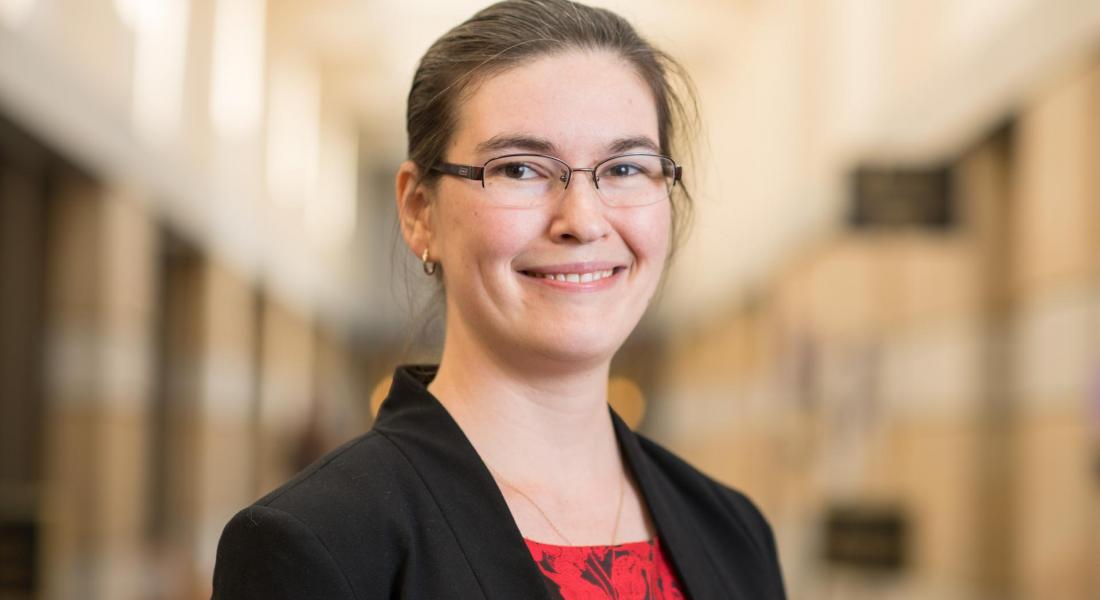
Kellogg Institute Dissertation Year Fellow Alison Fitchett Climenhaga is a theology student whose research concentrates on the role of religion – in particular, Christianity – in conflict and peace-building in Africa.
In Rwanda, she’s studying religious practices related to forgiveness and the 1994 genocide, focusing on a Catholic shrine dedicated to promoting reconciliation.
“Both victims and perpetrators go there to seek forgiveness and healing for atrocities committed and experienced,” she said. “They reconcile with themselves and with God, and that experience can contribute to repairing strained relationships with neighbors and family members.”
She’s also looking at church initiatives that address the fallout of the genocide – for example, supporting families where a parent has been in prison for years because of his or her role in the slaughter.
Meanwhile, she’s working in a rural village in neighboring Uganda that is home to two popular but competing Catholic charismatic movements (CCMs). Those groups are the subject of her dissertation, “Reconciling Charisma: Healing, Conflict, and Identity in Catholic Charismatic Movements in Uganda,” which examines how religious practices can generate conflict.
CCMs promise physical and spiritual healing, and can heal relationships fractured by domestic violence, HIV, and civil unrest, she said. But they can also divide communities by “touching and reorganizing the lives of families, church and civil society more broadly.
“Precisely this capacity renders CCMs a potentially volatile presence,” she explained.
Fitchett Climenhaga’s overall work examines the impact of religion on a number of core Kellogg research areas, including social development, identity formation, and human dignity.
Her mentor, Kellogg Faculty Fellow Mary Ellen Konieczny, wrote in a nomination letter for the fellowship that Fitchett Climenhaga’s dissertation is unique because it focuses on Catholic rather than Protestant charismatic movements.
It also goes beyond the traditional focus of charismatic movements on healing to look at how religion helps people navigate social change.
“She shows the ways in which religion provides cultural tools for making sense of, and devising strategies for, engagement with larger social realities in Uganda beyond individual control,” added Konieczny, who died earlier this year following a battle with cancer.
Even more important is Fitchett Climenhaga’s examination of the relationship between charismatic religion and healing, she said, “which allows her to further scholarly understanding of how human development and health – spiritual, psychological, and physical – are experienced and linked in religious milieus in the global South.”
Fitchett Climenhaga, who enrolled at Notre Dame in 2009 for graduate work in theological studies, came to the Kellogg Institute after realizing she was approaching questions about religion from an interdisciplinary perspective.
“I was looking at religion through the lenses of sociology, anthropology, and history,” she said. “I wanted to get linked up with a community where I could be in intentional interdisciplinary conversations, and Kellogg seemed like a good place to do that.”
Faculty Fellow Emmanuel Katongole, a professor of theology and peace studies with the Kroc Institute for International Peace Studies, said Fitchett Climenhaga’s work contributes significantly to the field of peace studies by exploring how physical and spiritual healing push the charismatic communities to contribute to either social reconciliation or conflict generation.
“The research has yielded crucial insights for understanding global Catholicism in general, African Catholicism in particular,” he said.
Faculty Fellow Paul Kollman, executive director of the Center for Social Concerns and head of Fitchett Climenhaga’s dissertation committee, said that with Catholics comprising nearly half of Uganda’s population, “there can be no doubt that the prominence of the charismatic religiosity among them shapes their lives as believers.
“Just as important, it also shapes their social and political attitudes and behaviors, so that understanding these movements provides insight into a great deal of people’s everyday experience,” he said.
After graduation, Alison will become a research fellow at the Institute for Religion and Critical Inquiry at Australian Catholic University in Melbourne.





